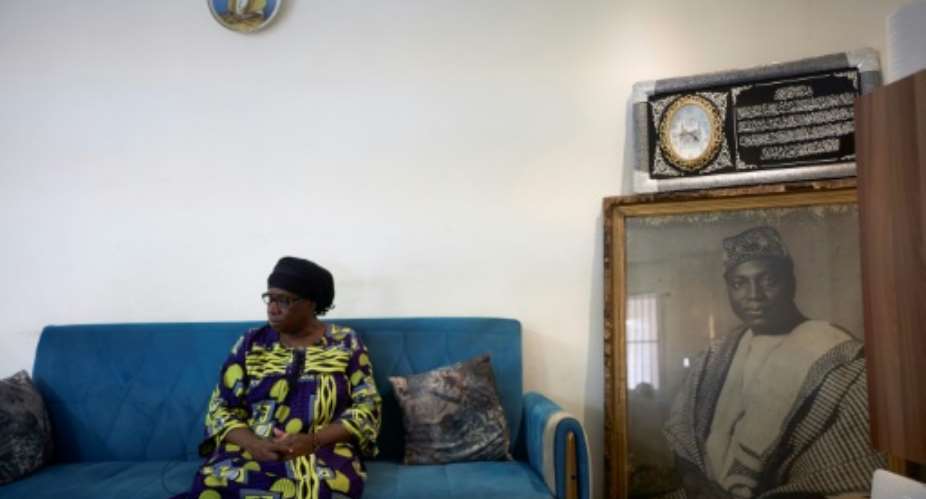Mali's first president Modibo Keita roused citizens to push the country forward when he took office in 1960, after decades of French rule, and precipitated a time many remember as one of industry and hope.
But 60 years on, the optimism of the post-independence era has given way to chronic instability in Mali, which is plagued by corruption, poverty and a lethal jihadist conflict.
Modibo Keita's remaining family members, who are nostalgic for his time in office, assiduously keep the ex-president's memory alive.
"He is the father of independence, he is the national father, he is the father of all Malians," says the ex-president's daughter Hatouma Keita, from the family home in the capital Bamako's old quarter.
She has hung a flag from her Bamako home as well as placards bearing her father's image for the country's independence day celebrations on Tuesday. Curious passersby stop to take a look.
After he came to power on September 22, 1960, Keita made his mark by pursuing socialist policies and large development projects.
 Modibo Keita's remaining family members are nostalgic for his time in office. By MICHELE CATTANI (AFP)
Modibo Keita's remaining family members are nostalgic for his time in office. By MICHELE CATTANI (AFP)
"Tomatoes, soldiers' boots, milk, matches, textiles, everything used to be made here," says Maimouna Diakite, Keita's adopted daughter.
Keita's government was not devoid of criticism at the time, however, and his economic policies provoked a strong backlash.
The president was overthrown in 1968 by Moussa Traore, a young army lieutenant, and he died in detention in 1977.
Traore -- who himself died last week, aged 83 -- went on to rule Mali with an iron fist for 22 years, a time during which few mentioned Keita, Diakite said, and many of the former president's family members fled.
But Keita's memory began to creep back into the public consciousness after the military toppled Traore in 1991.
Governments constructed a memorial in his honour, and named an airport and stadium after him.
'Above others'
Fatoumata Keita Diallo, the former leader's elderly third wife, says that the ex-president was "above others" politically.
"We need to find another Modibo Keita now, but you won't find one," Diallo said, alluding to Mali's latest political crisis.
A clutch of young officers overthrew president Ibrahim Boubacar Keita in a military coup on August 18, after months of protests against him in the country.
 A soldier prepares to play in a parade for a ceremony to mark the 60th anniversary of Mali's independence in Bamako on Tuesday. By MICHELE CATTANI (AFP)
A soldier prepares to play in a parade for a ceremony to mark the 60th anniversary of Mali's independence in Bamako on Tuesday. By MICHELE CATTANI (AFP)
Those protests were in part generated by Mali's inability to quell a brutal Islamist insurgency which first emerged in 2012, and has since spread to neighbouring Mali and Burkina Faso.
Mali is less hopeful today than when Keita took office 60 years ago.
"All Malians must consider themselves as mobilised for the construction of the republic of Mali, homeland of all those who are firmly committed to the achievement of independence and African unity," he said at the time.
For his adopted daughter Diakite, the achievement of that ambition lies in doubt.
"Are we even independent today?" she asks.





 SSNIT must be managed without gov’t interference – Austin Gamey
SSNIT must be managed without gov’t interference – Austin Gamey
 Ejisu by-election could go either way between NPP and independent candidate — Gl...
Ejisu by-election could go either way between NPP and independent candidate — Gl...
 We never asked ministers, DCEs to bring NPP apparatchiks for returning officer r...
We never asked ministers, DCEs to bring NPP apparatchiks for returning officer r...
 No one denigrated the commission when you appointed NDC sympathizers during your...
No one denigrated the commission when you appointed NDC sympathizers during your...
 Used cloth dealers protests over delayed Kumasi Central Market project
Used cloth dealers protests over delayed Kumasi Central Market project
 A/R: Kwadaso onion market traders refuse to relocate to new site
A/R: Kwadaso onion market traders refuse to relocate to new site
 Dumsor: Corn mill operators at Kaneshie market face financial crisis
Dumsor: Corn mill operators at Kaneshie market face financial crisis
 Jamestown fishermen seek support over destruction of canoes by Tuesday's heavy d...
Jamestown fishermen seek support over destruction of canoes by Tuesday's heavy d...
 Election 2024: EC to commence voter registration exercise on May 7
Election 2024: EC to commence voter registration exercise on May 7
 Public schools rebranding: We’re switching to blue and white, we’re painting all...
Public schools rebranding: We’re switching to blue and white, we’re painting all...
